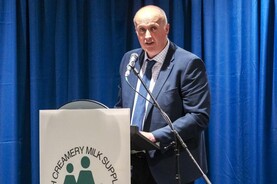Farmers who have lands taken by greenways will receive between €6,750 and €22,500 in a once-off goodwill payment under a new code of best practice.
The package agreed by farm organisations and Transport Infrastructure Ireland (TII) will ensure that the goodwill payment is secured where landowners agree to an early sign-on and ongoing co-operation with the greenway project.
The goodwill payment will be made on top of the value of any land acquired and compensation for other impacts on the farm.
These payments are graduated according to the length of greenway which passes through a property. They are expected as follows:
Up to 100m the payment is €6,750. From 101m to 250m the payment rises to €12,000.From 251m to 400m the payment is €17,250. From 401m to 550m the payment is €22,500. The payment levels have been agreed for a period of five years which starts from 1 January 2022.
Settle future disagreements
While negotiating access to land for greenways has proven contentious, particularly in Kerry and Galway, Minister for Transport Eamon Ryan said the code of best practice offered a framework in which to settle future disagreements.
“The code sets out a new way of developing our greenways in a collaborative way, which takes into account the views of landowners, local communities, other stakeholders and the needs of those who will use them,” Minister Ryan said.
Irish Farmers Association (IFA) president Tim Cullinan described the code as “an important safeguard for farmers” whose lands are on greenway routes.
This code allows for a clear engagement process to minimise the impact and disruption to individual farms
“The IFA and farmers understand the importance of greenways to local communities. However, they can impact significantly on farmers whose lands are along the route.
“This code allows for a clear engagement process to minimise the impact and disruption to individual farms, along with a sustainability payment to farmers for their co-operation with the project during the construction phase,” the farm leader said.
IFA environment chair Paul O’Brien said the adoption of voluntary land acquisition agreements, in order to avoid the use of compulsory purchase orders (CPOs), was an important aspect of the new code.
What the code of practice involves
The code of practice explains the procedures involved, including consultation, planning and design and construction.
In addition, it outlines how farmers can engage in the process and sets out how the voluntary land acquisition mechanism will work. It also outlines how the arbitration procedures operate.
Farmers who have lands taken by greenways will receive between €6,750 and €22,500 in a once-off goodwill payment under a new code of best practice.
The package agreed by farm organisations and Transport Infrastructure Ireland (TII) will ensure that the goodwill payment is secured where landowners agree to an early sign-on and ongoing co-operation with the greenway project.
The goodwill payment will be made on top of the value of any land acquired and compensation for other impacts on the farm.
These payments are graduated according to the length of greenway which passes through a property. They are expected as follows:
Up to 100m the payment is €6,750. From 101m to 250m the payment rises to €12,000.From 251m to 400m the payment is €17,250. From 401m to 550m the payment is €22,500. The payment levels have been agreed for a period of five years which starts from 1 January 2022.
Settle future disagreements
While negotiating access to land for greenways has proven contentious, particularly in Kerry and Galway, Minister for Transport Eamon Ryan said the code of best practice offered a framework in which to settle future disagreements.
“The code sets out a new way of developing our greenways in a collaborative way, which takes into account the views of landowners, local communities, other stakeholders and the needs of those who will use them,” Minister Ryan said.
Irish Farmers Association (IFA) president Tim Cullinan described the code as “an important safeguard for farmers” whose lands are on greenway routes.
This code allows for a clear engagement process to minimise the impact and disruption to individual farms
“The IFA and farmers understand the importance of greenways to local communities. However, they can impact significantly on farmers whose lands are along the route.
“This code allows for a clear engagement process to minimise the impact and disruption to individual farms, along with a sustainability payment to farmers for their co-operation with the project during the construction phase,” the farm leader said.
IFA environment chair Paul O’Brien said the adoption of voluntary land acquisition agreements, in order to avoid the use of compulsory purchase orders (CPOs), was an important aspect of the new code.
What the code of practice involves
The code of practice explains the procedures involved, including consultation, planning and design and construction.
In addition, it outlines how farmers can engage in the process and sets out how the voluntary land acquisition mechanism will work. It also outlines how the arbitration procedures operate.






 This is a subscriber-only article
This is a subscriber-only article










SHARING OPTIONS: